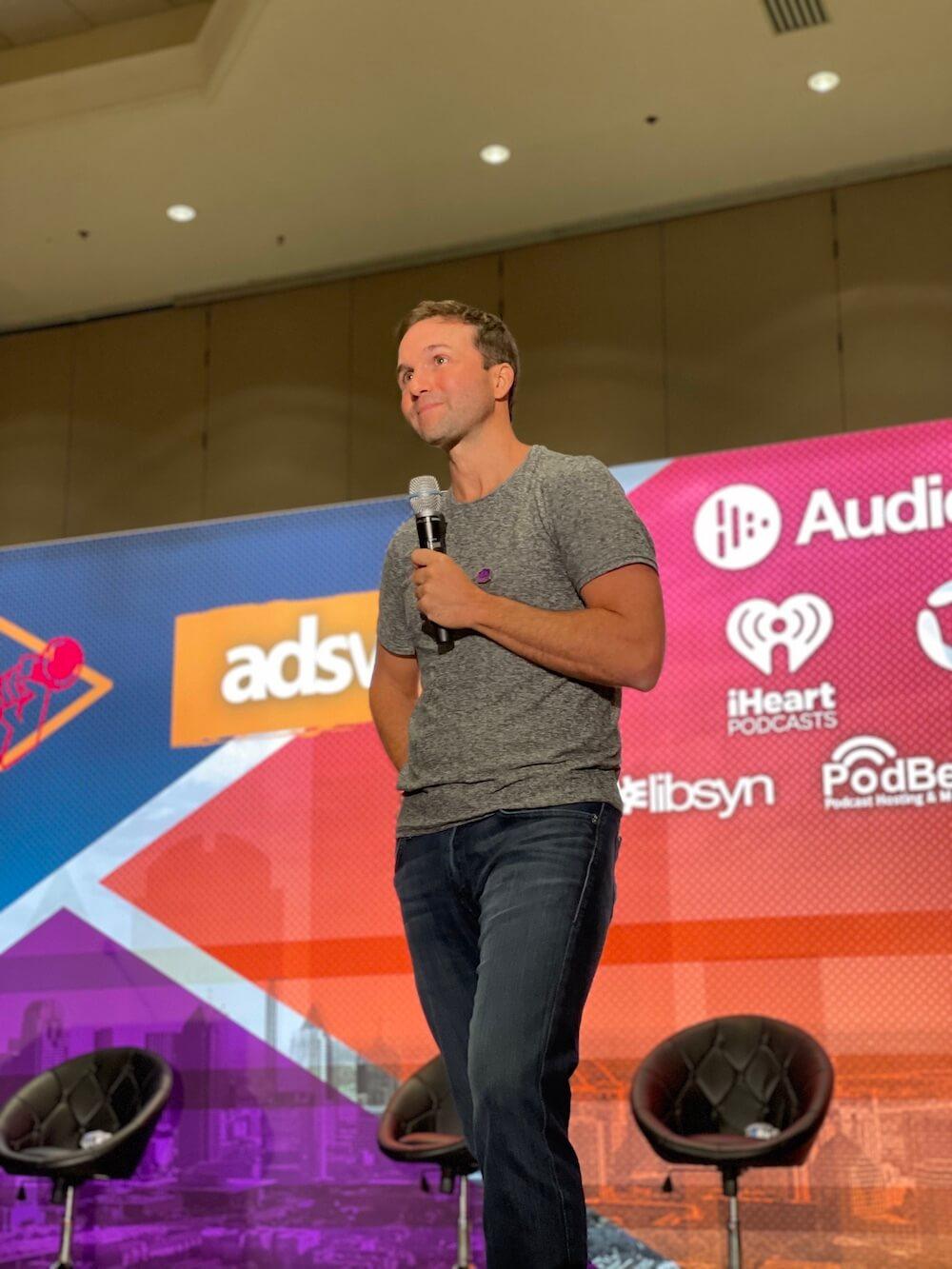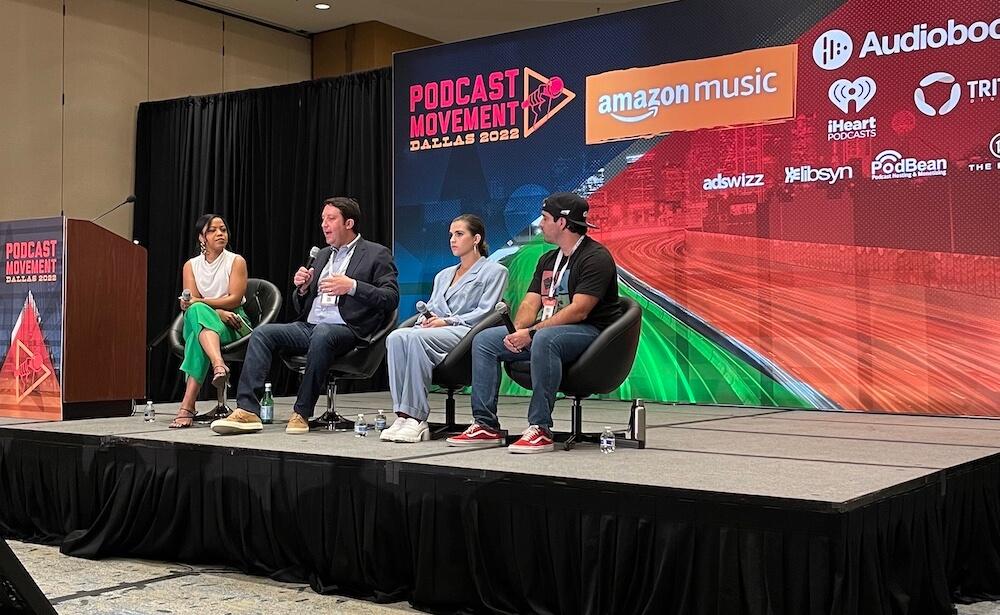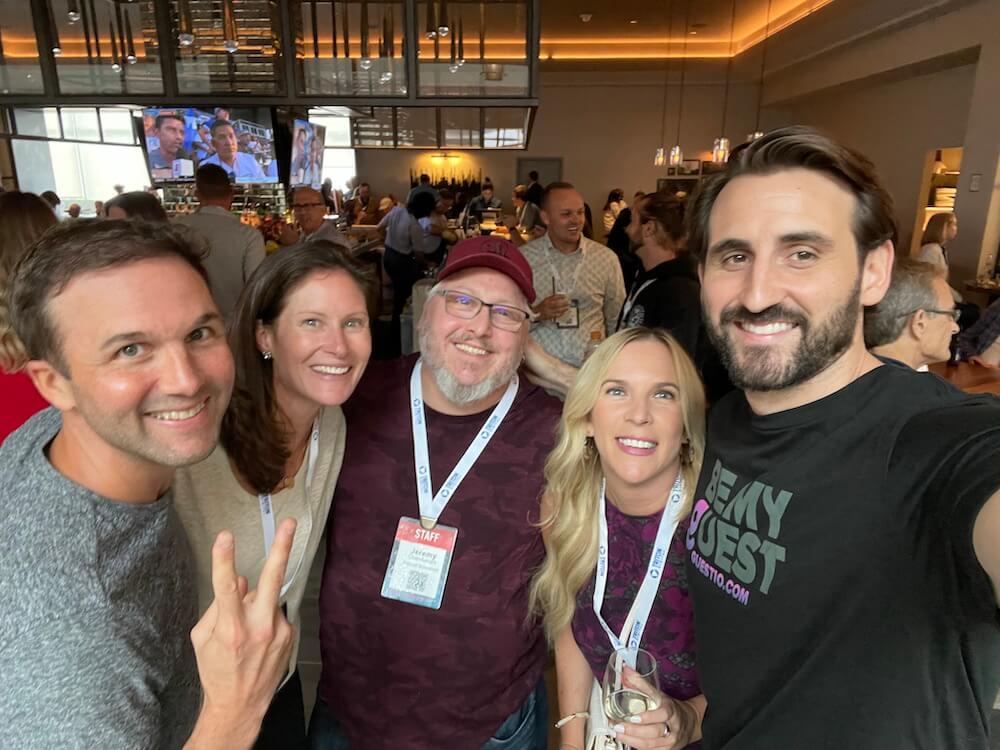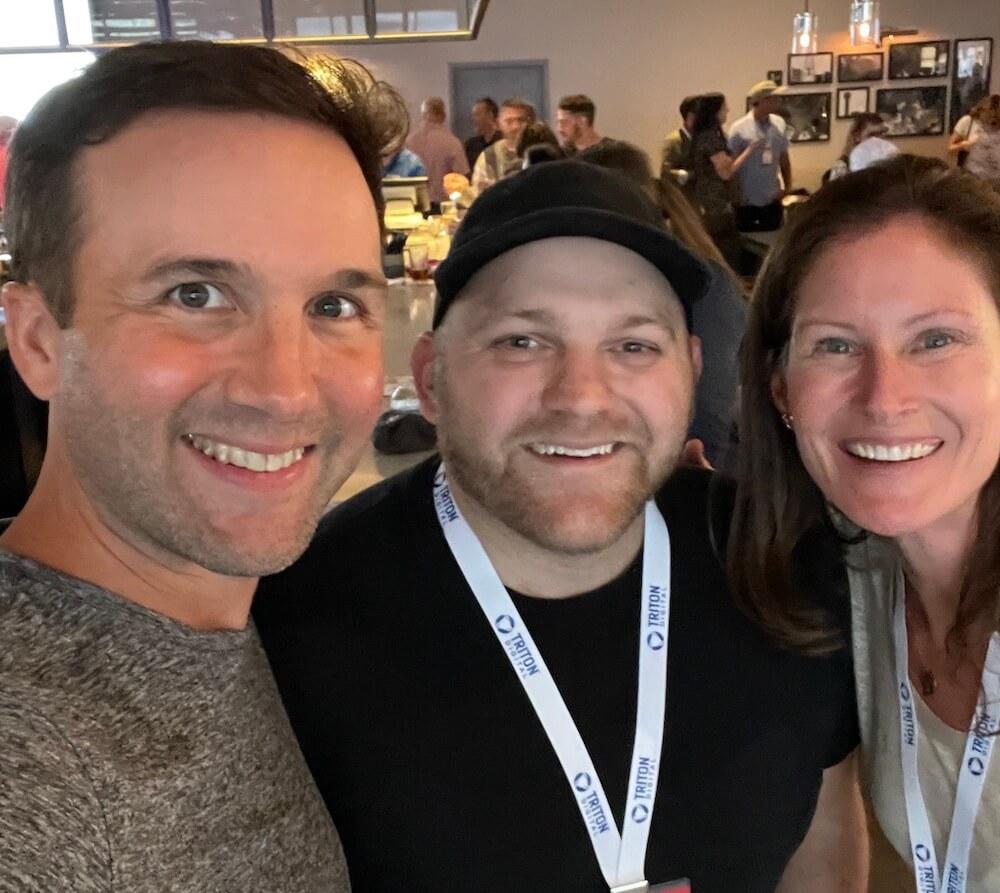If you’ve ever attended a Podcast Movement conference in the past, then you know it’s packed with greatness.
From sessions on all things podcasting a – z, almost 24/7 networking opportunities, an expo area with anything and everything podcast-related, and after hours parties that don’t disappoint, Podcast Movement delivers it all.
I’m excited to share my experience at Podcast Movement 2022, including my favorite takeaways, my biggest piece of criticism, and why I think in person events are critical to success.
My favorite takeaways from Podcast Movement
It’d be impossible to attend every sessions. Even with access to the replays, you’d be investing A LOT of time to watch every minute. And to tell you the truth, I wouldn’t recommend watching every session, because some of them are just not going to be valuable.
More on that when I share my biggest piece of criticism…
I hand-picked a few sessions I knew were going to be great and invested my time to really be present.
How’d I know they were going to be great?
I either knew the individual(s) presenting, or the topic and description were intriguing enough to get me in a seat.
I’m not trying to be almighty here, but I’ve been in the podcasting space and studying podcasting for 10 years – this is fact. I know a thing (or two), so I’m picky when it comes to spending my time in a room when I could be out in the hallways connecting with people.
In order of when they took place, here is a lineup of most of the sessions I attended. (Side note: there were a few sessions I couldn’t attend because they were overlapping with some of the below. Can’t do it all!)
Podcast Monetization
The first session I attended was on monetization – mostly so that I could hear what the presenters thought was the most relevant info to include.
The full session title was Podcast Monetization 101 (It’s Not Just Ads).
This session was presented by Caitlin Van Horn of Simplecast and Justine Benjamin of AdsWizz.
Something I found unique (and that I appreciated) was an upfront full disclosure that these companies were both sponsors of Podcast Movement. As a result, they were getting to decide what content was being shared.
Good to know.
Here are a few points made during the presentation that I thought were very helpful for anyone starting out in the podcasting space who is interested in monetizing their podcast.
- You don’t need 10,000 downloads per month to lock in a sponsor (but you do need a niche, engaged audience). Share with advertisers an engaged social media channel, or reach out to local businesses who might be interested in reaching your niche audience if you don’t have the downloads to attract advertisers.
- Two hardest ways to monetize: crowdfunding (on platforms like IndieGoGo or Kickstarter) and via subscriptions / memberships (like Patreon or Substack).
- If you want to sell swag, know that merchandise is TOUGH. For every dozen people who claim they’ll buy merch, maybe one of them actually will. And speaking from personal experience, merchandise is a lot of work for a little net revenue. Just check out our income and expenses for our journals in our income reports…
- Important question to ask yourself: What am I trying to accomplish with my podcast overall, and how does monetization fit into that?
- A midroll sponsorship spot is still the best placement (versus intro or outro).
One thing I felt they included in the presentation that was very misleading was stats on dynamically inserted ads versus baked in ads. While they did disclaim that the data was collected mostly from enterprise podcasters (not indie podcasters), I think it’s a presenter’s responsibility to know their audience.
People are very interested in numbers, and once they hear a number, it’s going to stick. Everyone in that room heard the numbers, but how many actually heard the disclaimer? Probably not many.
I’ll follow my own advice and not even share the stats, especially since they mean close to nothing for an indie podcaster.
Discoverability in Podcasting
The second session I attended was on discoverability: Fact vs. Fiction: How do you effectively boost discoverability?
This was a panel moderated by Courtney Kocak, with guests Ray Chao (Vox Media), James Cridland (PodNews), and James Carbary (Sweet Fish Media).
This was one of the better panels I’ve attended, and I have a lot of great things to say about this discussion, including:
- Courtney was an excellent moderator. She not only led the conversation well, she also asked relevant follow up questions – something I rarely see moderators do.
- You could tell the panelists actually prepared for the discussion. Oftentimes panels end up with a lot of responses along the lines of, “What they said…” That wasn’t the case here, thankfully.
Here are my top takeaways from this panel:
- Want more eyes and ears on your podcast? Go more niche; focus on quality and first-level principles (topic, avatar, why should people care); and be clear about what your podcast is about.
- How does one differentiate their marketing? Think about what other platforms you can get on outside of audio to help drive people to your podcast, like via written content (Google SEO). Where else are your listeners hanging out besides podcast apps? Meet them there. Also, what’s the hook that’s going to get someone to want to tell their friends about your show? All great questions to ask yourself as a podcaster IMO.
- Your podcast name and description are important. Make sure you have a good paragraph of info about your podcast and what listeners can expect.
- Critical marketing tactics being ignored include not leveraging “old school marketing”, like postcards, flyers, billboards, public transit; and post-launch awareness. Focusing on your launch period is great, but ongoing marketing is what will help you win in the long term.
This was a really great session, and I’m glad I chose to attend it.
Making money with your podcast
My third session was with our very own John Lee Dumas.
This year, instead of your traditional presentation, John decided to go with a straight Q&A session: Q&A with JLD: Anything you ever wanted to know about making money with your podcast but were afraid to ask.
What really stood out to me in this session was the quality of questions. Those brave enough to raise their hand and get on the mic were incredibly thoughtful when it came to what to ask – and there were A LOT of brave people in the room!
Here are just a few of the questions covered during John’s 45-minute session.
- Has your avatar evolved over time?
- Do you think unique sayings, like “boom! shake the room!” and “Fire Nation” have helped with your brand awareness?
- What is it like being a part of the HubSpot Podcast Network?
- What’s something you’re doing today you wouldn’t recommend a new podcaster do?

I won’t leave you hanging… here were John’s answers – in short:
- Has your avatar evolved over time? No – I started out serving Jimmy, and today, I’m still serving Jimmy. But there may be situations where your avatar evolves, or you find that you’re serving two different individuals.
- Do you think unique sayings, like “boom! shake the room!” and “Fire Nation” have helped with your brand awareness? Absolutely. They’ve set me apart because they’re unique and they give my audience things to know me by.
- What is it like being a part of the HubSpot Podcast Network? The HubSpot Podcast Network has been incredible. It has helped me grow my show, bring more awareness to the Entrepreneurs On Fire brand, and the team is incredibly supportive. They run a lot of great programs for their creators and we love being brought to you by the HubSpot Podcast Network!
- What’s something you’re doing today you wouldn’t recommend a new podcaster do? Interviews. Instead, do a niche show addressing an underserved topic. Once you have your topic, start by writing down 50 of the top questions or struggles related to that topic (these could be questions you hear a lot, things you see on social media related to your niche, etc). Now you have your first 50 episode topics – hit record!
Closing thoughts included what we’d refer to as a value bomb: “No one wants a pale, weak imitation of someone else. They want you and your uniqueness. Your ability to be the #1 solution to a real problem.”
As John’s session came to a close and he asked for final questions, there were still more than 15 hands raised. Perhaps Q&A sessions are going to pick up steam among presenters who can answer any question served up to them. I hope so!
You might call me biased, but I really enjoyed this session.
Should you join a podcast network?
Next session I attended was a panel with the HubSpot Podcast Network: Growing Better Together: Why you should join a network.
In case you didn’t know, Entrepreneurs On Fire is brought to you by the HubSpot Podcast Network :)
The panel was moderated by the Head of Creator Partnerships at the HubSpot Podcast Network, Alanah Joseph.
Joining her on the panel were Carly Baker, Community Manager for the HubSpot Podcast Network; Benjamin Shapiro, host of the MarTech Podcast; Luis D. Camejo, one half of the BizBros brand and Content is Profit podcast.
This was another panel where full disclosure was provided around the fact that the HubSpot Podcast Network sponsored it, and everyone on the panel was a part of the HubSpot Podcast Network. Again, much appreciated.
I also valued that one of the panelists, Luis, had experience as a part of another podcast network, so it was interesting to hear a bit about his past experience.
I felt that, while the panel was exclusively HubSpot Podcast Network representation, they still shared feedback and advice that was relevant for any podcasters looking to join any network.
In a nutshell, podcast networks can provide powerful support and marketing tools for podcasters. However, not every network is created equal.

Top things to consider if you’re interested in joining a podcast network include:
- Can the network help you reach your podcasting goals?
- What can you bring to table?
- Will you retain all rights and editorial control over your show?
- What is the monetization structure, and is it what you want?
- Will you be advertising the network (other podcasts within the network and potentially the network brand, as is the case with HubSpot), or will the network be buying 3rd party ads on your behalf? If the latter, are you prepared to advertise whatever 3rd party the network chooses?
- Is the vision of the network and your vision aligned?
- Make sure you fully understand the terms of the contract you’re signing
If you’re interested in learning more about joining a podcast network we have a dedicated post on Joining a Podcast Network – Should you do it?
Marketing advice for your podcast
Next up was a session from Rob Walch of Libsyn: Yes, That Marketing Advice for Your Podcast is BS.
Being the Vice Pres of Libsyn Enterprise and Platform Partnerships, Rob knows a thing or two about podcasting, marketing, statistics – and overall – what’s working and what’s not in the podcasting space.
Here are a few key takeaways from Rob’s presentation:
- The most impactful thing you can do for your podcast is get people to hit the subscribe or follow button. According to Rob, the number of subscribers / followers you receive over 24-hr rolling periods carries the most weight in the Apple Podcasts algorithm for ranking shows within the app. Note: on Apple Podcasts, this is specially referred to as a “follow”, not a “subscribe”.
- Apple Podcasts’ search function looks for title, author, and number of followers when returning search results. So, your title and author fields matter!
- Advertising on other shows works. Look for other shows in your industry or niche (or shows that have the same audience as you) and consider reaching out to see if you can sponsor their show.
- I found this to be a very unique idea: Rob recommended that if you see a show in your niche that hasn’t published content in a while, reach out and pitch them to publish your most recent episode on their feed.
We have been using Libsyn as our podcast host since the very beginning, and that’s why we love being their affiliate! If you want to get the rest of this month and next month free, use promo code FIRE when you sign up!
Understanding your podcast audience
The last session I attended at this year’s Podcast Movement was with Dave Jackson, a podcasting consultant and host of the School of Podcasting.
It was all about helping you understand your audience. The full title of his presentation: Above Your Hosting Stats: 5 Additional sources to help you understand your audience.
Dave has been podcasting for a LONG time, and when I see an indie podcaster on the agenda who has been in the podcasting game, well, basically since the beginning, I go!
The long and short of Dave’s presentation: You have access to amazing stats. If you leverage them, then you can make some very well informed decisions about your podcast and content.
Most people assume the one and only stat you should care about is your number of downloads, or listens. But your stats go so much deeper, like how long people listen to any given episode, the exact second they decide to drop off an episode, where you have the most listeners (on which platform), and so on.
So while there isn’t some magical aggregator of all the incredible things there are to know about each and every one of your podcast episodes on every podcast platform (also known as a podcast directory), you can go to most platforms individually to see snapshots (and details) of this info.
- Apple Podcasts Connect Stats
- Spotify Stats for Podcasters
- Google Stats for Podcasters
- Amazon Stats for Podcasters
An interesting stat that Dave shared during his presentation that I thought was VERY relevant for anyone at Podcast Movement: 70% of podcast growth comes from word of mouth marketing.
Sounds like getting your listeners to tell their friends about your podcast is a pretty awesome marketing strategy.
My biggest piece of criticism
Earlier in this post I mentioned that I wouldn’t recommend watching every session – even if you have access to the replays – because some of them are just not going to be valuable.
To pick up that thread again, my biggest piece of criticism about this year’s Podcast Movement event was that panels and sponsored content dominated the agenda.
I definitely understand that panels allow for varying opinions, but 95% of the time moderators aren’t great at moderating and/or participants have done absolutely zero preparation.
I was very happy to attend two panels this year that both fell into the 5% that are great (IMO), but if I had to guess, over 70% of the sessions this year were presented by more than one person. That leaves a lot of room for sub-par content.
I also understand sponsors can be necessary to run a big event; however, I don’t think sponsored content should overwhelm the schedule.
In few cases I found that the sponsored content did add value (noted above in the sessions I attended), but I know there were many cases where it didn’t, and that’s not fair to the people who paid money to be there and learn real tactics and strategies to help them grow their podcasts.
All of this said, I do give the expo area this year two thumbs up. The setup was very walkable, easy to get through, and was centrally located – a plus for both sponsors and attendees!
Why in person events are critical to success
I’ve focused on content almost exclusively in this post, and now it’s time to talk about all the other things that events have to offer: networking, new relationships, deeper connections, and a lot of fun!
Podcast Movement has never disappointed when it comes to the crowd of attendees it attracts, and every year (I’ve attended every event since the beginning), one of my favorite parts about the event is getting to meet new friends and reconnect with old ones.



We got to host our Podcasters’ Paradise meet up, attend a Libsyn party, hangout with our team over at HubSpot Podcast Network, and catch up with a lot of great friends we’ve met at past Podcast Movement events!
We also got to have a sit down with a company we’re considering a partnership with, and having those meetings in person is always a good thing.
Connections are such a huge part of success in business – and in life. And I don’t know of a better way to connect than in person at awesome events like Podcast Movement!